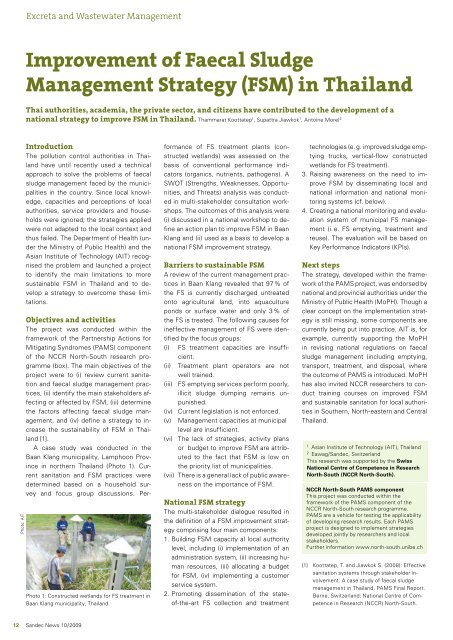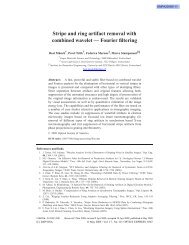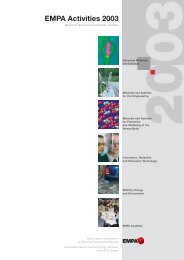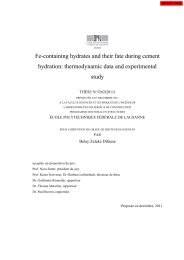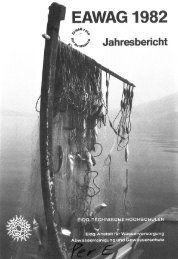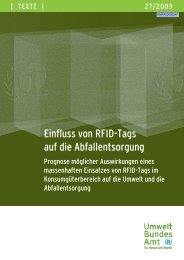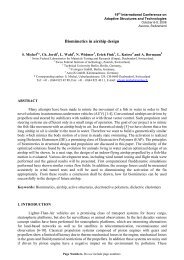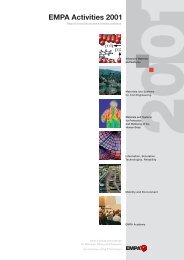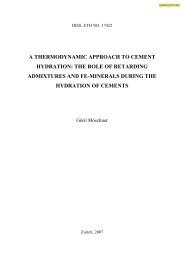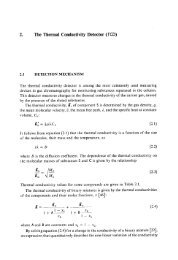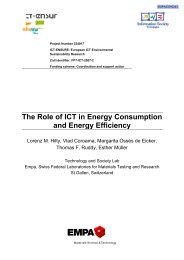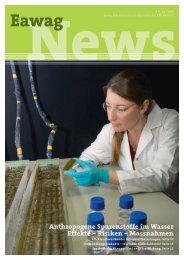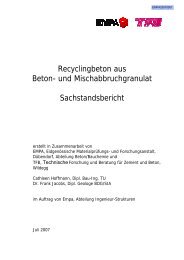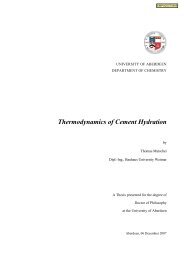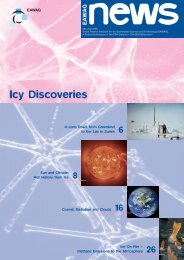Sandec - Eawag
Sandec - Eawag
Sandec - Eawag
You also want an ePaper? Increase the reach of your titles
YUMPU automatically turns print PDFs into web optimized ePapers that Google loves.
Photo: AIT<br />
Excreta and Wastewater Management<br />
Improvement of Faecal Sludge<br />
Management Strategy (FSM) in Thailand<br />
Thai authorities, academia, the private sector, and citizens have contributed to the development of a<br />
national strategy to improve FSM in Thailand. Thammarat Koottatep 1 , Supattra Jiawkok 1 , Antoine Morel 2<br />
Introduction<br />
The pollution control authorities in Thailand<br />
have until recently used a technical<br />
approach to solve the problems of faecal<br />
sludge management faced by the municipalities<br />
in the country. Since local knowledge,<br />
capacities and perceptions of local<br />
authorities, service providers and households<br />
were ignored; the strategies applied<br />
were not adapted to the local context and<br />
thus failed. The Department of Health (under<br />
the Ministry of Public Health) and the<br />
Asian Institute of Technology (AIT) recognised<br />
the problem and launched a project<br />
to identify the main limitations to more<br />
sustainable FSM in Thailand and to develop<br />
a strategy to overcome these limitations.<br />
Objectives and activities<br />
The project was conducted within the<br />
framework of the Partnership Actions for<br />
Mitigating Syndromes (PAMS) component<br />
of the NCCR North-South research programme<br />
(box). The main objectives of the<br />
project were to (i) review current sanitation<br />
and faecal sludge management practices,<br />
(ii) identify the main stakeholders affecting<br />
or affected by FSM, (iii) determine<br />
the factors affecting faecal sludge management,<br />
and (iv) define a strategy to increase<br />
the sustainability of FSM in Thailand<br />
[1].<br />
A case study was conducted in the<br />
Baan Klang municipality, Lamphoon Province<br />
in northern Thailand (Photo 1). Current<br />
sanitation and FSM practices were<br />
determined based on a household survey<br />
and focus group discussions. Per-<br />
Photo 1: Constructed wetlands for FS treatment in<br />
Baan Klang municipality, Thailand.<br />
1 <strong>Sandec</strong> News 10/2009<br />
formance of FS treatment plants (constructed<br />
wetlands) was assessed on the<br />
basis of conventional performance indicators<br />
(organics, nutrients, pathogens). A<br />
SWOT (Strengths, Weaknesses, Opportunities,<br />
and Threats) analysis was conducted<br />
in multi-stakeholder consultation workshops.<br />
The outcomes of this analysis were<br />
(i) discussed in a national workshop to define<br />
an action plan to improve FSM in Baan<br />
Klang and (ii) used as a basis to develop a<br />
national FSM improvement strategy.<br />
Barriers to sustainable FSM<br />
A review of the current management practices<br />
in Baan Klang revealed that 97 % of<br />
the FS is currently discharged untreated<br />
onto agricultural land, into aquaculture<br />
ponds or surface water and only 3 % of<br />
the FS is treated. The following causes for<br />
ineffective management of FS were identified<br />
by the focus groups:<br />
(i) FS treatment capacities are insufficient.<br />
(ii) Treatment plant operators are not<br />
well trained.<br />
(iii) FS emptying services perform poorly,<br />
illicit sludge dumping remains unpunished.<br />
(iv) Current legislation is not enforced.<br />
(v) Management capacities at municipal<br />
level are insufficient.<br />
(vi) The lack of strategies, activity plans<br />
or budget to improve FSM are attributed<br />
to the fact that FSM is low on<br />
the priority list of municipalities.<br />
(vii) There is a general lack of public awareness<br />
on the importance of FSM.<br />
National FSM strategy<br />
The multi-stakeholder dialogue resulted in<br />
the definition of a FSM improvement strategy<br />
comprising four main components:<br />
1. Building FSM capacity al local authority<br />
level, including (i) implementation of an<br />
administration system, (ii) increasing human<br />
resources, (iii) allocating a budget<br />
for FSM, (iv) implementing a customer<br />
service system.<br />
2. Promoting dissemination of the stateof-the-art<br />
FS collection and treatment<br />
3.<br />
4.<br />
technologies (e. g. improved sludge emptying<br />
trucks, vertical-flow constructed<br />
wetlands for FS treatment).<br />
Raising awareness on the need to improve<br />
FSM by disseminating local and<br />
national information and national monitoring<br />
systems (cf. below).<br />
Creating a national monitoring and evaluation<br />
system of municipal FS management<br />
(i. e. FS emptying, treatment and<br />
reuse). The evaluation will be based on<br />
Key Performance Indicators (KPIs).<br />
Next steps<br />
The strategy, developed within the framework<br />
of the PAMS project, was endorsed by<br />
national and provincial authorities under the<br />
Ministry of Public Health (MoPH). Though a<br />
clear concept on the implementation strategy<br />
is still missing, some components are<br />
currently being put into practice. AIT is, for<br />
example, currently supporting the MoPH<br />
in revising national regulations on faecal<br />
sludge management (including emptying,<br />
transport, treatment, and disposal, where<br />
the outcome of PAMS is introduced. MoPH<br />
has also invited NCCR researchers to conduct<br />
training courses on improved FSM<br />
and sustainable sanitation for local authorities<br />
in Southern, North-eastern and Central<br />
Thailand.<br />
1 Asian Institute of Technology (AIT), Thailand<br />
2 <strong>Eawag</strong>/<strong>Sandec</strong>, Switzerland<br />
This research was supported by the Swiss<br />
National Centre of Competence in Research<br />
North-South (NCCR North-South).<br />
NCCR North-South PAMS component<br />
This project was conducted within the<br />
framework of the PAMS component of the<br />
NCCR North-South research programme.<br />
PAMS are a vehicle for testing the applicability<br />
of developing research results. Each PAMS<br />
project is designed to implement strategies<br />
developed jointly by researchers and local<br />
stakeholders.<br />
Further information www.north-south.unibe.ch<br />
[1] Koottatep, T. and Jiawkok S. (2008): Effective<br />
sanitation systems through stakeholder involvement:<br />
A case study of faecal sludge<br />
management in Thailand. PAMS Final Report.<br />
Berne, Switzerland: National Centre of Competence<br />
in Research (NCCR) North-South.


